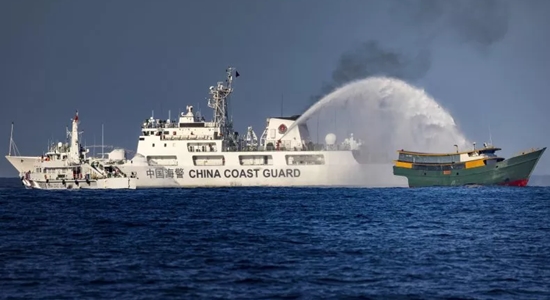
Don’t breathe a sigh of relief just yet when you read the Newsweek headline, “China Agrees To Deescalate in South China Sea” (July 22, 2024). These seven words are as phony as a three-dollar bill, which news of further conflict in the South China Sea will confirm soon enough.
An indication that the agreement is no agreement comes in the article’s very first sentence, which starts promisingly enough: “China and the Philippines say they’ve arrived at an understanding to de-escalate tensions over a flashpoint in the South China Sea…”
Promising, because hitherto the tensions have been only escalating as China bullies the Philippines and other countries in the vicinity for moving around in their own waters. And as the headline tells us, China has agreed to de-escalate. It has agreed!
Yet messaging…
But then we get the rest of the sentence: “…yet messaging from both governments on Monday hints at different interpretations of the agreement.”
Uh oh. Differing interpretations of an understanding that has been arrived at? What understanding? What arrival?
Nor is the differing understanding of the understanding a trivial one.
The feature at stake is Second Thomas Shoal, a contested reef within the Philippines’ internationally recognized exclusive economic zone where the country stations a contingent of marines on a rusting warship, the BRP Sierra Madre, grounded in 1999 to stake Manila’s claim.
China claims the feature, as it does most of the South China Sea, as its territory, citing historical rights, despite an international tribunal’s 2016 ruling dismissing Beijing’s sweeping claims. Philippine resupply and troop rotation missions to the Sierra Madre over the past year have been met with forceful responses from Chinese forces, with clashes in March and June leaving several Philippine personnel injured and testing the U.S.-Philippine Mutual Defense Treaty.
“The Philippines and the People’s Republic of China have reached an understanding of principles and approaches that will be observed by both sides in order to avoid misunderstanding and miscalculation in the conduct of the Philippines’ lawful and routine rotation and resupply missions to the BRP Sierra Madre in Ayungin Shoal,” the Philippines’ Department of Foreign Affairs said in a statement released Friday….
The [Chinese] ministry said China expects the Philippines to tow the Sierra Madre but that until this occurs, it will allow resupply missions to continue on two conditions on a humanitarian basis on two conditions: that Manila gives Beijing advanced notice and does not send “a large amount” of construction materials to repair the warship or build a permanent outpost….
Later on Monday, the Philippine [Department of Foreign Affairs] disputed its Chinese counterpart’s interpretation of the deal, calling the claims about prior notification and on-site confirmation “inaccurate.”
An Associated Press report says:
China had previously said it would allow food, water and other basic supplies to be transported by the Philippines to its forces at the shoal if Manila agreed not to bring construction materials to fortify the crumbling ship and to give China advance notice and the right to inspect the ships for those materials, the officials said.
The Philippines rejected those conditions, and the final deal did not include them, according to the Philippine officials.
The claim of the Philippine government that what the Chinese government is saying about the final agreement is “inaccurate,” a way of accusing China of lying, means that there is no agreement.
Philippine acceptance of such requirements—that it not use “too much” material to fix a ship lying within its exclusive economic zone, that it not build an outpost in its EEZ, and that it conduct resupply missions and otherwise move around in its EEZ if and only if it gives the Chinese government advance notice each time—would be tantamount to ceding China’s claim over the disputed near-Philippines waters and giving up its own claim. Operating by permission is not operating by right.
No agreement
Why would the Philippines have agreed to relinquish its rights over the disputed waters?
The Philippines did not, not even accidentally. This assertion is plausible because:
1) The Chinese government always lies.
2) That the Chinese government should be lying now is consistent with the fact that it lies always.
3) The chances of confusion or misunderstanding about such a crucial point are vanishingly small. Even if the interpreters had done an inadequate job of translating the words of the negotiators, the “understanding” that had been “reached” would presumably have been written down so that it could be checked and double-checked.
Newsweek does not refer to text of an agreement, but an Associated Press story says, “Neither side released the text of the agreement,” which implies that a text exists. If China is lying about the agreement and the text of the agreement would make this clear, the Philippine government should release the text. Why not?
Also see:
StopTheChinazis.org: “Japan to the Rescue in the South China Sea?”
“Oddly enough, everyone in territorial disputes with China is negotiating, but no one is getting anywhere.”





